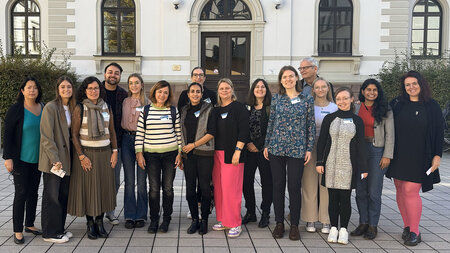e-mobility

The research of the working group e-mobility focuses on the user experience and behaviour in the field of electric mobility from the perspective of engineering and traffic psychology. Herein electromobility is regarded as an integrated system of energy supply and mobility. The focus of the working group is the investigation of questions concerning human-machine interaction in the context of this overall system.
This includes topics such as user interaction with energy resources or the design of human-machine interfaces. Innovative individual applications as well as integrated system solutions and prototypes are tested. A wide range of methodological approaches characterizes the working group's research approach. It comprises field studies, laboratory experiments, and test drives, as well as diary studies, classical surveys, user interviews, focus groups, and expert evaluations. The tight integration of highly diverse data (i.e., data fusion), e.g. qualitative interview data and high-resolution vehicle data is a characteristic element of the research. This allows for valuable insights that cannot be achieved with two methods (i.e., data sources) applied in isolation. The development of reliable and valid methods is a key focus of the research.
The perpetual goal is to generate knowledge that is also meaningful beyond the specific examined technical system and to contribute to the development of engineering and transport psychology through theoretical and methodological developments and well-founded empirical evidence.
Some examples of typical research questions are:
- How do drivers experience and interact with information and assistance systems for ecodriving?
- How can incentive systems for controlled charging of electric vehicles be designed that they achieve a high sustainability effect and, simultaneously, a positive user experience?
- How do user interfaces have to be designed to ensure that the interaction with the energy resources in the system is as comfortable as possible for the users?
- How can drivers be optimally supported in the context of low-noise driving?
- What causes range stress (range anxiety) and how can it be avoided?
- How can smartphone apps (remote interfaces) complement electric mobility systems?
- How can user interfaces of charging stations be designed optimally?
- In which way can range extender concepts enhance acceptance and user experience?
Current Projects:
-
FLOW Flexible energy systems Leveraging the Optimal integration of EVs deployment Wave
Finished Projects:
-
SteigtUm! System of small electric vehicles for private and commercial purposes as a comprehensive approach to solve urban mobility problems
-
BDL Bidirectional Charging Management
-
NEMoGrid New Energy Business Models in the Distribution Grid
-
ECoMobility implementation of an innovative connected mobility concept with battery electric vehicles, pedelecs and the public transport
-
MINI E BERLIN - powered by Vattenfall daily use and costumers acceptance of electric vehicles
-
MINI E - powered by Vattenfall V2.0 market acceptance and enviromental benefir of electric vehicles
-
Gesteuertes Laden V2.0 [Managed Charging V2.0] Enhancing effectivity and effieciency of the Wind-to-Vehicle (W2V) and Vehicle-to-Grid (V2G) applications including charging infrastructure
-
Gesteuertes Laden 3.0 [Managed Charging 3.0] Grid integration of electric mobility on the way to the first commercial solutions
-
BMW ActiveE Berlin Customer acceptance and usability of electromobility with BMW ActiveE
-
BMW ActiveE Leipzig Customer acceptance of electromobility for driving with uncreased range demands - long-distance commuters
-
AdAntE Adaptive drive train systems for e-mobility
-
fahrE Concepts of multi-modal electric mobility using local renewable energies
-
EVERSAFE Everyday safety for electric vehicles
-
EVREST Electric vehicle with range extender as a sustainable technology
-
Open-air lab New Mobility safety, use and user acceptance of emobilitiy
-
Academic education initiative "showcase emobility" Bavaria/Saxony
-
COST NVH analysis techniques for design and optimization of hybrid and electric vehicles





